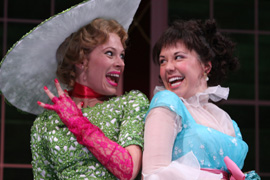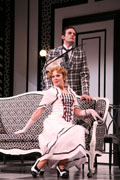
Paulanne Simmons
"Redgrave in Ernest Again"
Directed by David Schweizer
Paper Mill Playhouse
22 Brookside Drive, Millburn, NJ
Jan. 14 through Feb. 15, 2009
Wed. 7:30 p.m., Thur. 2 and 7:30 p.m., Fri. 8 p.m., Sat. 2 and 8 p.m.,
Sun. 2 and 7:30 p.m.
Tickets: $25 - $92 (973) 376-4343
Reviewed by Paulanne Simmons Jan. 24, 2009.
 |
Lynn
Redgrave as Lady Bracknel. Photo by Gerry Goodstein. |
Undoubtedly many people will come to Paper Mill Playhouse’s revival of “The Importance of Being Earnest” to see Lynn Redgrave as Lady Bracknell, a role she played three years ago in a five-month tour of the show. But they will leave equally impressed with the entire cast, Alexander Dodge’s eye-catching set and David Schweitzer’s eccentric direction.
Oscar Wilde’s comic masterpiece is both biting satire and enormously funny. It’s an exploration of personal identity. The two heroes, Jack Worthing (Wayne Wilcox) and Algernon Moncrieff (Jeffrey Carlson), both have fictitious identities that allow them to misbehave with impunity. But they both really aspire to be steady husbands and (one supposes) eventually good fathers.
The play is a comment on the hypocrisy and uselessness of the idle rich. When Jack confesses that he smokes, Lady Bracknell says, “I’m glad to hear it. A man should always have an occupation of some kind.”
And it’s a sly jab at the silliness of romantic love. Both Gwendolen Fairfax (Annika Boras), whom Jack is in love with, and Jack’s ward, Cecily Cardew (Zoe Winters), who has caught the eye of his friend, Algernon, are adamant that their future husband be named Ernest. They often seem more in love with the romantic concept than with the actual men.
But the underlying joke, of course, is the play on the word “earnest” and the name “Ernest.” Wilde, whose flippancy probably got him into trouble as much as his homosexuality, has created characters that are far from earnest no matter what their names might be.
 |
L-R:
Annika Boras (Gwendolen Fairfax) and Zoë Winters (Cecily Cardew).
Photo by Gerry Goodstein. |
Add to all this the unlikely attraction between Miss Prism (Cynthia Mace) and the Reverend Canon Chasuble (Keith Reddin) and you have a first-rate dramatic comedy seldom if ever surpassed in English theater.
 |
| L-R: Annika Boras (Gwendolen Fairfax) and Wayne Wilcox (John Worthing) Photo by Gerry Goodstein. |
Schweizer has added his own zany touch to the outlandish satire. He puts Wilde himself in the balcony (played by Chris Spencer Wells) observing the actors onstage. He turns on the footlights, and has the actors move downstage where they address the audience directly. With the help of Dodge’s set design, he gives Algernon an extravagant Victorian flat, done up in black and white and decorated liberally with animal heads.
Certainly Redgrave is magnificent as the autocratic and thoroughly wacky Bracknell. But Winters almost steals the show as the exuberant and se lf-assured Cecily, a worthy contender to Boras’s Gwendolyn. While Wilcox and Carlson hold their own as the ardent but not so earnest lovers.
The best thing about “The Importance of Being Earnest”
is how many times you can watch it without being bored. This is especially
true when a director is as innovative as Schweizer and a cast as talented
as in this Paper Mill Playhouse production.
| museums | NYTW mail | recordings | coupons | publications | classified |
